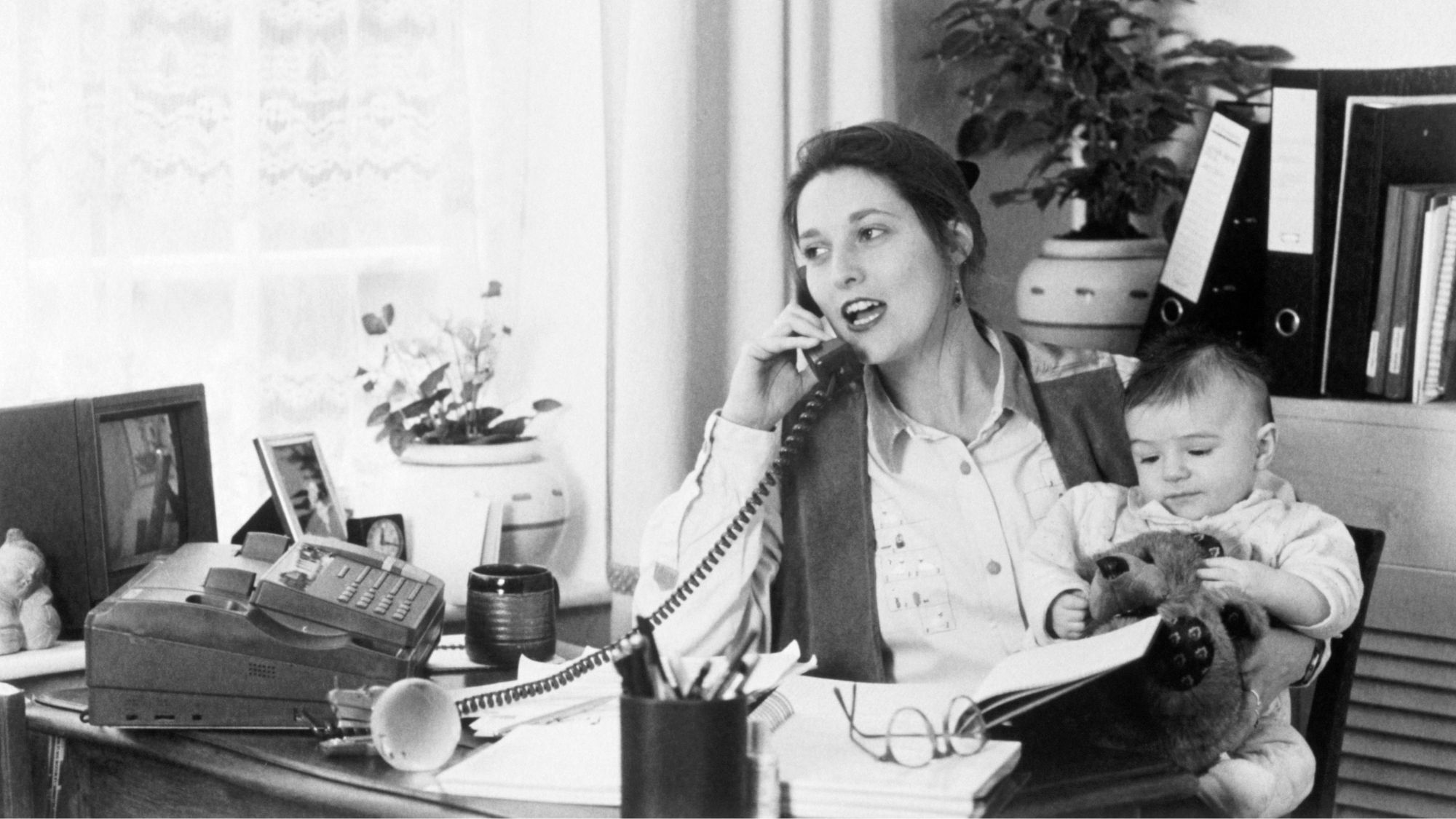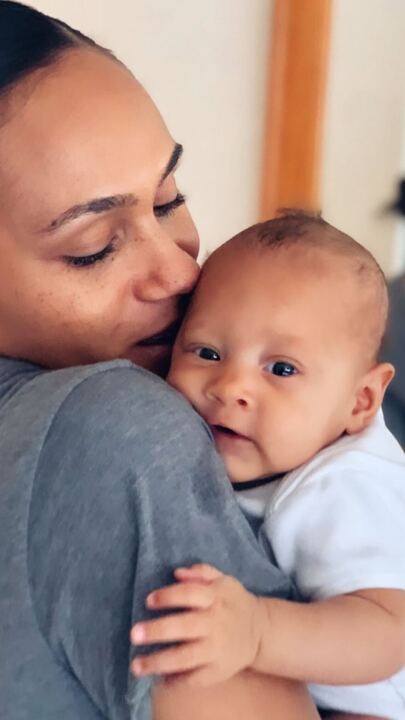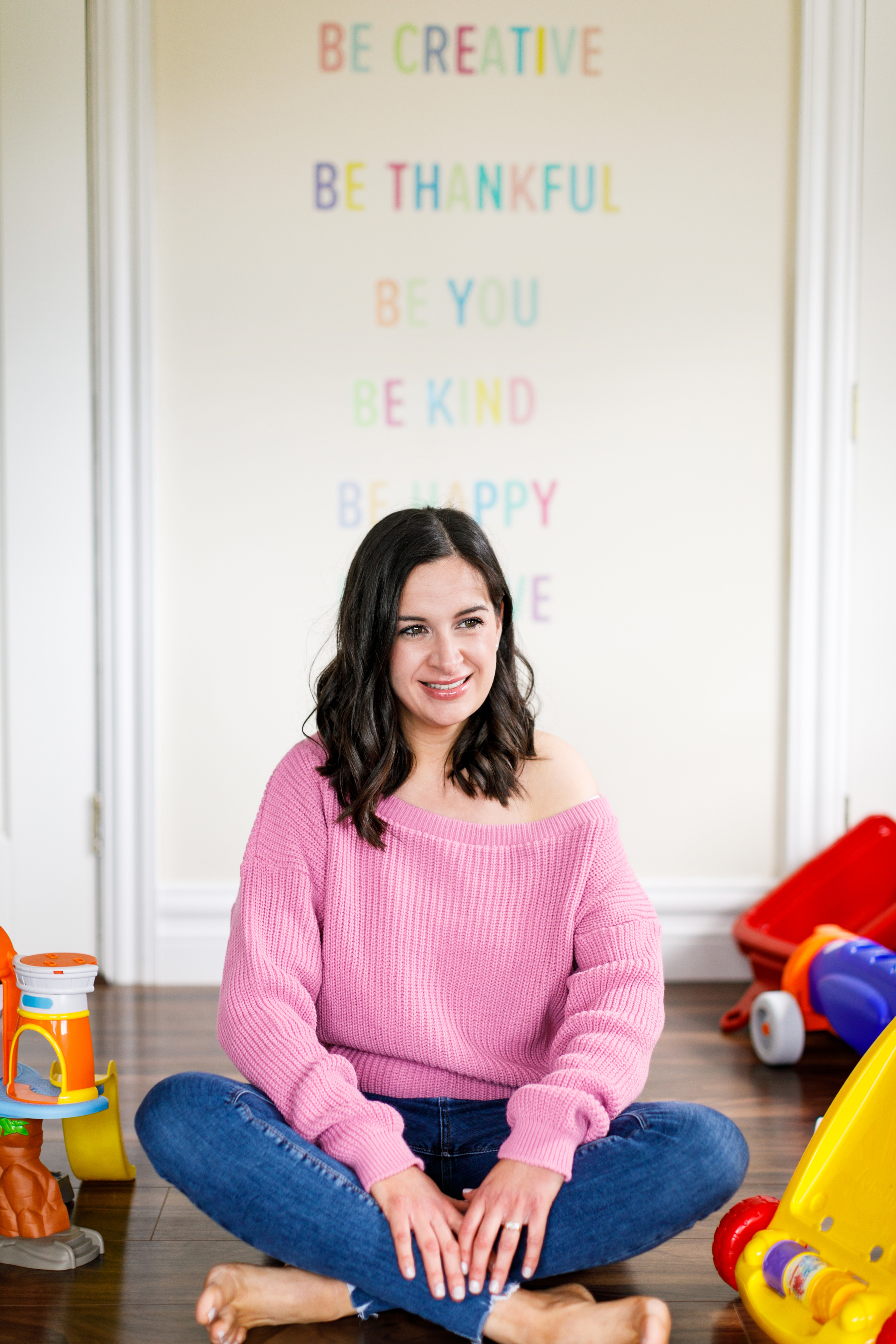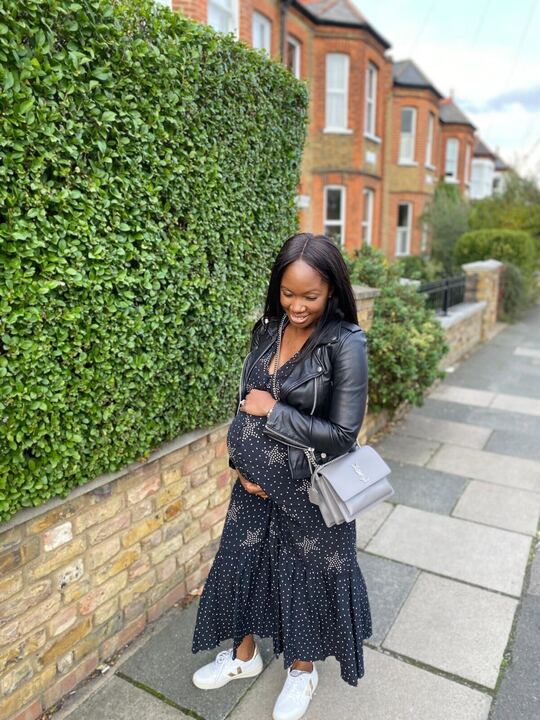What 4 mothers wish they knew about maternity leave before they took it
“I see why some women then decide to not go back to work—who wants to pay £1500 for your child to be in nursery 8 am-6pm?”


Women are being blamed for falling birth rates, but can we really be surprised that more and more women are opting out of motherhood when the penalty for having children is so staggering—and shamefully—high?
Motherhood is never far from the headlines and this week the online chatter has been deafening. Just days after a Loose Women episode discussing whether or not women should be incentivised to have children aired, a report by Pregnant Then Screwed revealed that more women than ever are being forced out of the workforce.
Though shocking and shameful, the report isn't entirely new. In fact, it chimes with a report published late last year by UN report that showed that one in four mothers are forced out of the workforce due to soaring childcare costs. Shortly after that report was published, Kemi Badenoch’s comments on “excessive” maternity leave pay sent waves of frustration throughout the nation.
Mothers often carry the lion’s share of parenting and are routinely penalised as a result. The ‘Motherhood Penalty’ affects roughly a quarter of a million UK mothers, forcing 26% to drop their hours to accommodate caretaking responsibilities and 25% to unwillingly leave the workforce entirely. It’s an experience Ann-Marie Kinlock, founder of KindHaus, a family club for modern parents, knows all too well. She was made redundant at two months pregnant and again when her son was seven months old. “In a country that claims to be developed, women with children under the age of five are highly impacted by financial hardship,” adds Kinlock.

Maxine Palmer, Head of Service Development at the National Childbirth Trust says that while starting a family is a personal decision that shouldn't be influenced by external economic challenges, for anybody considering having a child in 2025, "we know there’s pressure from every angle. With the cost of living crisis, unaffordable childcare costs and career implications of taking parental leave, we need to do more to support new and expectant parents.”
A survey by Open Study College found that one in three working parents have to make significant career sacrifices to afford childcare, and 22% agreed that the system is specifically unfair to working mums.
“All too often women end up leaving jobs because that is the only way to resolve the stress and then finding work as a new mother is very hard,” agrees Elizabeth McGlone, Managing Partner of Didlaw a boutique discrimination firm specialising in women’s rights in the workplace.
Celebrity news, beauty, fashion advice, and fascinating features, delivered straight to your inbox!
The UK also offers some of the lowest maternal pay when compared to other European countries. Estonia, Poland, and Luxembourg all offer mothers 20 weeks at 100% pay, while countries including Portugal, Germany, and Spain pay mothers their full salary for the duration of their maternity leave according to World Population Review.
Our support systems are failing and ever more expectations are loaded onto mothers.
Here, four women share their unique and honest experience of maternity leave and what they wish they’d been told before they took it.
Everything four women wish they were told about maternity leave
“I found it really traumatic and way too soon.”
“Maternity leave did not give me enough time to recover mentally and physically from my birth. I remember being at my trade stand in Olympia with a giant sanitary towel in and leaking boobs just feeling completely discombobulated, and like I was in a trance.
I ran my own small clothing label, and I was only able to take five weeks maternity leave because I had a big trade show. I had to take him with me to set up and man the stand every day, and that was very stressful and unpleasant. I was really devastated to have to do that.
I needed a lot longer at home, I was still bleeding after my birth when I went back to work, and I still hadn't established breastfeeding properly. I wasn't getting any sleep—I found it really traumatic and way too soon.
I found it really hard to have to ask my husband for money.
Becca Maberly
I found it very difficult balancing childcare and returning to work, I was too nervous to shell out for expensive childcare—which was about £100 a day at our local nursery—in case I didn’t make it back with my business. So I would take my son with me to the office, which was really hard because he cried a lot when he was a tiny baby, and as he got bigger, he moaned and whinged and wanted to get out of his buggy or his car seat or whatever I’d taken him in.

“Maternity leave did not give me enough time to recover mentally and physically from my birth.” - Becca Maberly
He started crawling very early in and that walking/crawling stage was impossible to have him in the office. I couldn’t get anything done except for when he was asleep. I found it really hard to have to ask my husband for money. That wasn’t something that came naturally to me.”
Becca Maberly, 46, had her first child at 33 and her second child at 35, she had been running her own business for 5 years when she became pregnant. She is a postnatal expert, author and founder of A Mother Place.
“I needed to reduce my hours by 15 minutes to pick up my daughter...work calculated how much time I’d be taking out and deducted my pay”
“Being a mum, there are some things that people don’t tell you. I had the standard maternity pay, so after nine months, I had to decide whether I was gonna go back to work or take the next three months unpaid. I decided to go back to work.
Finding a nursery was tough; a lot have long waiting lists but it’s also hard trying to find one that fits around your work hours and also runs during term time. I’ve paid for a nursery, and now I need to pay for someone else to look after my child because I can’t take all those weeks off over Christmas, Easter and six weeks in the summer. If, like me, you don’t have family nearby, that’s a problem.
So bearing in mind, I’ve had restricted pay because I’m on maternity leave, once you do find somewhere, it’s the cost. My monthly payment for nursery was £1500, which in itself is rent, or, as the bank sees it; another mortgage. If you were trying to get a mortgage, the bank would reduce your rate because they see nursery as another mortgage.

“I see why some women decide to not go back to work.” - Tamara Thomas
You need to pay a month upfront and the deposit for me was £500—that’s 2k I need to pay upfront before I’ve even gone back to work, as well as being on reduced pay. When I went back, I needed to reduce my hours by 15 minutes in the morning and the evening to get to the nursery to pick up my daughter, otherwise I would get a late fee. My work then calculated how much time I’d be taking out and deducted that from my pay and told me what my new salary was, which was so demoralising. You work all that overtime and then they deduct my pay by 15 minutes—they’re really gonna just deduct that? It was demoralising, but I had to do it.
I see why some women then decide to not go back to work—who wants to pay £1500 for your child to be in nursery 8 am-6pm? They’re in nursery more than I’m at work, and I’m paying for it.”
Tamara Thomas, 39, had her daughter at 34 and had been in her job for three years when she became pregnant.
“I found it really lonely going from engaging with people every day to having this tiny little person that I had no idea how to take care of.”
“The most challenging part of adjusting to maternity leave for me was going from a career that I’d studied, trained in and was part of a team to suddenly having this new identity as a mum and having no idea how to do the job and losing that massive part that felt in control and knew what I was doing.
I felt so lost and I missed the social connection of my career, which surprised me because when I was pregnant, I thought I was gonna love maternity leave.

“I felt so lost and I missed the social connection of my career” - Laura Guckian
The week I set up my Mind Mommy Coaching, I had a massive surprise and found out I was pregnant with baby number three— my daughter Anna. I worked right through my pregnancy and didn’t take maternity leave per se because I was self-employed. But you know what? Out of all of my postpartum periods, I enjoyed the one with Anna the most, because I was self-employed.
I think for mothers—and I see this through my work—it depends on their career and how satisfied they are. If they’re in a career they love and they have an accommodating employer who understands the needs of mums, in my experience—and the work I do with my clients—they’re happy to go back to work. Very often what I see with my clients is they’re forced out of the workplace and end up going down the self-employment route.
When it comes to being a mother, none of us know what we’re doing.
Laura Guckian
I wish someone had told me about that shift in identity that you will feel as a mum and the short-term grief of seeing your colleagues in a career that you know how to do. When it comes to being a mother, none of us know what we’re doing. Everyone’s winging it, and that feels like a massive shift in identity.”
Laura Guckian, had her first child at 31 and had been in her job for about 18 months when she became pregnant. She has three children; Leo, 8, Alex 4.5, and Anna, 3. She is the Founder of Mind Mommy Coaching and the host of the Momfessions podcast.
“I wish I knew how much of an adjustment it would be to go from earning a regular salary to not earning”
“The biggest shock, financially, was how much it costs to return to the workplace. When it comes to juggling childcare and work, I think the first time anyone goes through this, it’s a shock to the system. I had to figure out how to blend my ambitions with everything that I wanted at home and everything that I wanted to achieve at work. As time went on, I became more efficient and more ruthless with my time.
Another challenge I faced was going from earning a monthly salary and having to make the mental shift to surviving on statutory maternity pay, then once that was over, having to make the mental shift to nothing coming into my bank account. That’s quite a shift if you’re used to having that monthly salary and then suddenly there isn’t anything coming in.

“Lots of people are getting paid just enough to cover childcare” - Tobi Asare
There is so much that I wish I’d known before going on maternity leave. I knew I was ambitious before I went on maternity leave, and I didn’t appreciate how much of a journey I would go on to reconnect with my ambitions. I wish I knew how much of an adjustment it would be to go from earning a regular salary to not earning. I also wish I knew the journey that I would go on when it comes to finding my confidence, finding my feet again in the workplace and realigning, refining and reconciling my ambitions whilst raising a young family.
Something I wish I’d explored more was shared parental leave. It’s really prudent to explore those conversations because just the female or the dominant parent taking an extended maternity leave might not always be the best financial solution—sharing it might be the best financial solution.”
Tobi Asare, had her first child at 29 and had been in her job for three years when she became pregnant. She works full-time on the board of a UK media agency and runs My Bump Pay.

Mischa Anouk Smith is the News and Features Editor of Marie Claire UK.
From personal essays to purpose-driven stories, reported studies, and interviews with celebrities like Rosie Huntington-Whiteley and designers including Dries Van Noten, Mischa has been featured in publications such as Refinery29, Stylist and Dazed. Her work explores what it means to be a woman today and sits at the intersection of culture and style. In the spirit of eclecticism, she has also written about NFTs, mental health and the rise of AI bands.